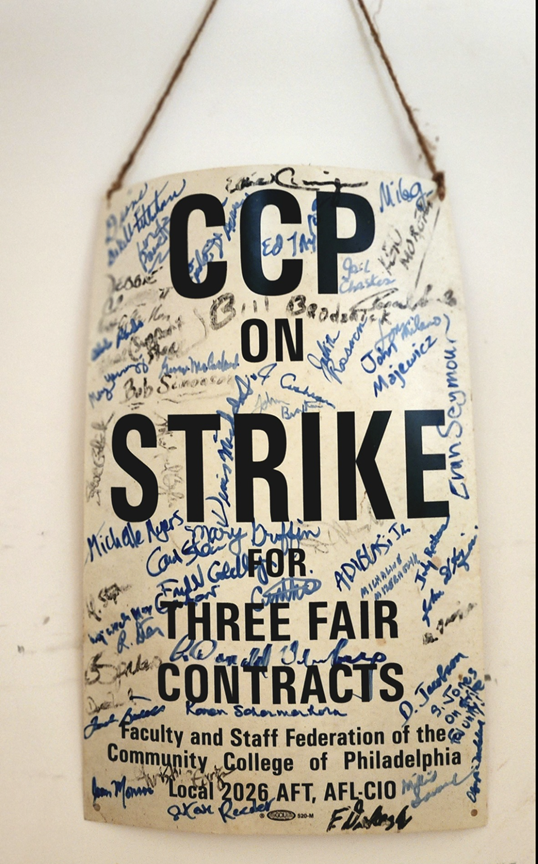Jayson Massey
April 3, 2024
Labor unions represent workers and negotiate with employers over wages and working conditions. Historically, labor unions fought for safer conditions, better working hours, better pay for workers, and an end to child labor. On Main Campus, the Faculty and Staff Federation of Community College of Philadelphia (FSFCCP) Local AFT 2026 bargains for fair contracts and better working conditions for Classified Employees (staff), Part-Time and Visiting Lecturer Faculty (work assignments per semester), and Full-Time Faculty (including librarians and advisors).

In an interview with Junior Brainard, a Co-President of Local AFT 2026, he talked about the main issues in union negotiations, role of school funding, outlook for similar unions, political landscape, and why open bargaining for contracts is being used. The union is holding regular bargaining sessions for the Classified Employees, Part-Time, Visiting Lecturer Faculty, and Full-Time Faculty contracts. These contracts expire August 31, 2024.
Salaries are a seriously contentious issue. The earliest proposed contract has pay freezes and pay cuts, while health care costs triple. The main non-salary issues in negotiations are staffing, facility workload, and support. In terms of staffing, since the COVID pandemic, there has been a 25 percent reduction in Classified Employees (CE) while the student population has recovered.
Another big issue that the union sees salary inequality. Living wages and part-time faculty pay are a real focus. Twenty-five percent of the union members are not earning a living wage. Local AFT 2026 is looking for a $20 minimum wage for CCP and job study should be made more available for CEs. Some part-time faculty earn as little as 50 percent of the credit hour rate of full-time faculty. The union would like to see it raised to 80 percent or more.
Also, students now require more academic and emotional support. Next, the current faculty class size is 36, and the proposed class size is 24, a reduction of 33 percent. Class sizes have risen since the pandemic, and smaller class sizes generate better student grades. Larger classes and fewer staff to support students create more work for faculty and staff without a corresponding pay increase to go along with the workload.
Other issues that would benefit the common good for CCP teachers include childcare and faculty leadership. On-campus childcare would support parents and faculty, which CCP currently does not offer. According to the recruiting and talent acquisition site Beamery, the interest in employer-sponsored care benefits surpassed gym memberships, enhanced parental leave pays, and wellbeing programs. In addition, faculty leaders need clear agreements. Programs and faculty leadership need better diversity, equality, inclusion, and effective coordination.
College and university unions are experiencing similar challenges according to Local AFT 2026. New faculty jump through hoops and meet with lots of committees. There is less job security and merit pay for faculty, while administrators get more power and control. Currently, CCP can fire new faculty for any reason. In a broader sense, academic freedom is under assault. The administration is bargaining to eliminate the seniority system, which makes positions gained via office politics, not merit.
CCP has over 700 high school students in its Dual Enrollment Program. While this program benefits all students, especially underserved ones, it creates additional work for faculty and staff. It also takes more work to balance high schoolers with older adults. There is new money budgeted just for Catto scholars, who are first-time and full-time students. Most CCP students do not have that background. Local AFT 2026 would like Catto scholar benefits, like help with books, food, transportation, and career coaching extended to all students.
Public funding is critical for higher education. The funding formula for Pennsylvania (PA) community colleges should be split in thirds between the Commonwealth, the City of Philadelphia, and the students. Currently, the students provide 42 percent of the funding, the city provides only 27 percent, the state provides 26 percent, and tuition fulfills the rest of the operating budget.
Local AFT 2026 asserts that Pennsylvania needs to fund community colleges and keep them independent. They worry that the proposed consolidation of Pennsylvania’s State System of Higher Education (PASSHE) with the Commonwealth’s fifteen community colleges could add more state control while the colleges lose power. Decisions about Philadelphian students could be made in Harrisburg, the state capitol. And federal funding is critical. The Covid Pandemic brought with it the Higher Education Emergency Relief Fund (HERF), which were emergency grants for higher education institutions to guarantee learning persists for students. This money improved the financial position of the school and provided cash to students. This money has already been spent and may not be returned based on negotiations in Congress.
Local AFT 2026 is conducting open bargaining. All sessions are open for workers to walk in and are to be transparent, which helps understanding, is more democratic, and shows power – there is power in numbers. I was able to observe a bargaining session between Local AFT 2026 and CCP. Having sides makes things more adversarial and less collaborative. Generating agreement about topics like agendas and data are important to build trust and have productive conversations.

Seth Anderson-Oberman, an Organizer at SEIU Healthcare Pennsylvania, has lots of experience with labor negotiations. The first thing to do is to prioritize the lowest scale employers. Chestnut Hill Hospital was short-staffed, and the pay scale favored less experienced white workers instead of the more experienced non-white workers. His team bargained for a stepped-up seniority-based pay scale and ladders for advancement for experienced workers. Seth added that “unions are an effective way to help people” because a union is an “organization of workers that do together what they can’t do alone.”
